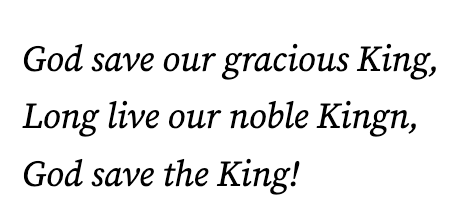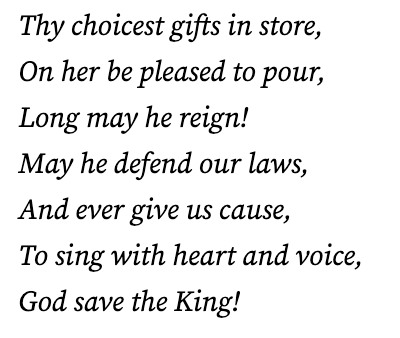"Long live our noble Kingn"
« previous post | next post »
 A story in this morning's Guardian (Alex Finnis, "National Anthem lyrics: How the words will change to God Save The King after the Queen’s death") evokes the (now generally unfair) nickname of Grauniad, spelling King as "Kingn".
A story in this morning's Guardian (Alex Finnis, "National Anthem lyrics: How the words will change to God Save The King after the Queen’s death") evokes the (now generally unfair) nickname of Grauniad, spelling King as "Kingn".
I've been told that the issue behind the nickname arose because the Guardian was typeset in Manchester (where it was founded), and then the printed copies were shipped by train to London. There was typically only one edition per day, and so typographical errors could not be corrected in later editions, as they could be for London-based papers, where the edition printed in the wee hours would be superseded by editions printed at intervals throughout the day.
Wikipedia has some of the story but not the geographical part (which may not be true?)
Frequent typographical errors during the age of manual typesetting led Private Eye magazine to dub the paper the "Grauniad" in the 1960s, a nickname still used occasionally by the editors for self-mockery.
Update — and also in the last verse, we see:

It's not a typo, but the retention of "her" in the opening sequence is also worthy of a snicker:
Thy choicest gifts in store,
On her be pleased to pour,
Long may he reign!
[h/t A K M Adam]
And in other news:
Can't believe we have a man as queen. Fucking Liberal, woke bullshit.
— Ari (@ari85_) September 9, 2022
A man as queen???
This woke, LGBTQ agenda has gone too far now!!
— Jessop Tweets (@GavGlyndwr) September 9, 2022
It's 2022, I never thought the world would get so woke we'd have a man as a queen.
But here we are.
— ❌🍄🇨🇦Ƒʉͫcͧкͭιͪηͣ Liberal Proper Gander™🇺🇸🍄❌ (@EldonJackson8) September 8, 2022
Recasting the Queen as a man has ruined my childhood. I mean the head of state as ALWAYS been a woman! Why change it now? Woke lefty nonsense.
— Eva Johansen (@EvaJoha97650122) September 9, 2022
…and so on…
Philip Taylor said,
September 9, 2022 @ 11:06 am
Unbelievable, the online edition still has the gender confusion in the last verse (comment timed 17:06 UK time) —
However, the source does not appear to be the Guardian — the URL root is https://inews.co.uk/, which I believe to be a part of the Independent group rather than that of the Guardian.
mg said,
September 9, 2022 @ 11:49 am
It's interesting to realize that England was ruled by queens for 120 of the past 185 years (65% of the time). None of the reigns of men in between Queen Victoria and Queen Elizabeth came close in length – the longest was 25 years for King George V.
Peter Taylor said,
September 9, 2022 @ 12:51 pm
Before seeing this I had already commented to some friends that even if I remember to sing King instead of Queen I'll probably get at least one pronoun wrong for at least the next couple of years, in the same way that I usually get the year wrong when writing the date in January.
klu9 said,
September 9, 2022 @ 1:53 pm
Tangentially, the Spanish-language news here mentioned the notice of her death was posted on the gates of Balmoral by "dos lacayos", i.e. "two lackeys". I assumed calling them "lackeys" in English might be conceivably correct but rather harsh, but it turns out "lackey" has (at least archaically) a literal meaning of "liveried manservant" that I never knew about until looking it up. https://en.wikipedia.org/wiki/Lackey_(manservant)
AKMA said,
September 10, 2022 @ 1:35 am
Philip Taylor — unchanged as of this morning. And yes, it’s from the i (formerly the Independent.
Philip Anderson said,
September 10, 2022 @ 3:45 am
@mg
England hasn’t had its own monarch since 1707. It’s been just one part of, successively, the Kingdom of Great Britain, the United Kingdom of Great Britain and Ireland, and now the United Kingdom of Great Britain and Northern Ireland. Queens have reigned for 140 years in that time – your 120 is wrong BTW, it should be 63+70 (with Anne for 7 years).
Tim Williams said,
September 10, 2022 @ 5:42 am
@Philip Anderson
Ireland and Great Britain were only united from 1801 to 1922. That is when we should start counting years of GB and NI. Strictly speaking we in the UK have only had a male monarch from then until 1952 (30 years) and 70 years of QEII. The boundaries of the royal dominions keep changing….
/df said,
September 10, 2022 @ 6:01 am
lacayos = footmen, according to UK media usage.
The word "footman", in so far as it is used at all, hasn't gathered the pejorative meaning that "lackey" has. Dontcha just love the extensive almost-but-not-quite duplicated multi-origin vocabulary of English, where utterances that might appear synonymous to a novice speaker can have totally different interpretations (no doubt other ambiguous languages are available).
Apparently the new King now has to tour the regions to
suppress rebellionsaddress regional assemblies.Robert Coren said,
September 10, 2022 @ 10:30 am
I learned the non-pejorative lackey="servant" before I ever heard the more modern sense, by reading The Three Musketeers (in English translation) as a child. (Direct translation of the French lacquais, presumably; I have no idea if the French word has the modern pejorative connotation.)
I have this idea kicking around in my head that the first line of God Save the King used to be "God save our lord the King", and "gracious" was introduced for the "Queen" version because "lady" wouldn't scan and "lord" wasn't appropriate. But I'm an American, so what do I know? The UK did have a King for the first not-quite-six years of my life, but in those days I knew nothing about him or his anthem.
Coby said,
September 10, 2022 @ 11:48 am
Robert Coren: I wonder if "lord" might be appropriate now, since quite a few offices of Lord Mayor and Lord Lieutenant are held by women. For that matter, I think Elizabeth II was Lord (not Lady) of Mann.
Kate Bunting said,
September 10, 2022 @ 11:56 am
I understood that it was originally "God save great George our King" (referring to George II). According to Wikipedia, both this and "our lord the King" were sung in 1745.
If Robert's theory is correct, the words would presumably have been changed for Queen Victoria.
klu9 said,
September 10, 2022 @ 11:56 am
Presumably as part of his tour of the regions, the new King will be h̶a̶r̶r̶y̶i̶n̶g̶ levelling up the North. And on on his return, he might reward himself with a sherry at his Mayfair local, I Am The Only Running Lackey.
https://en.wikipedia.org/wiki/The_Only_Running_Footman
Robert Coren said,
September 11, 2022 @ 9:35 am
Sorry about the failure to close the italics in my previous post. I don't understand why WordPress won't let one edit comments.
KevinM said,
September 17, 2022 @ 1:25 pm
The pejorative sense of "lackey" was surely turbocharged by Marxist, later Soviet and Chinese Communist, terms of political abuse ("bourgeois lickspittle gentleman's gentleman", etc.). Hmm, it occurs to me that "lickspittle" belongs in the "Compound agent nouns in English" post, above.